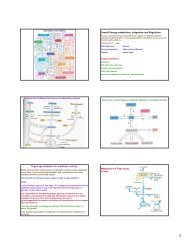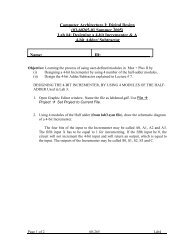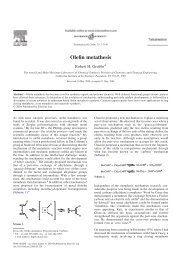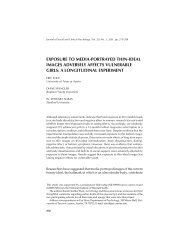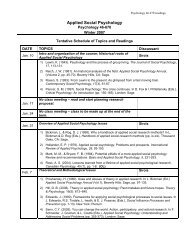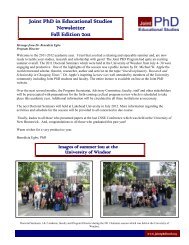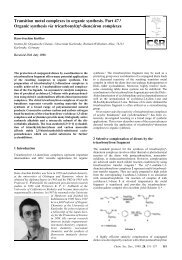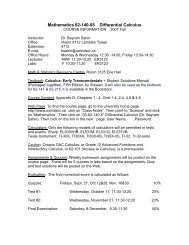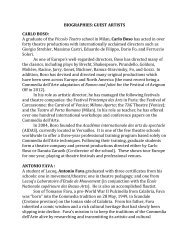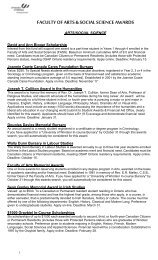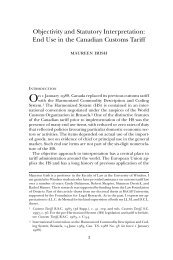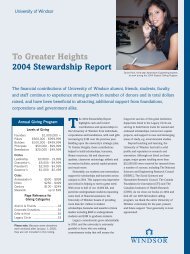Critical Social Work - University of Windsor
Critical Social Work - University of Windsor
Critical Social Work - University of Windsor
Create successful ePaper yourself
Turn your PDF publications into a flip-book with our unique Google optimized e-Paper software.
Brown<br />
<strong>Critical</strong> Reflexivity<br />
In social work, Fook (2002) has made popular the notion <strong>of</strong> critical reflection. This article<br />
is critically reflexive <strong>of</strong> anti-oppressive conceptual practices thinking critically from within<br />
critical theory; turning critical thinking back on ourselves (D’Cruz, Gillingham, & Melendez,<br />
2007; Finlay, 2008; Fook, 2002, 2003; Fook & Aga Askland, 2007; Fook, White, & Gardner,<br />
2006; Yip, 2006). Baines (2011) argues that in order to promote social justice in front line social<br />
work practice “self-reflexive practice and ongoing social analysis are essential components <strong>of</strong><br />
AOP” (p. 7). We need not limit ourselves to being critically reflexive <strong>of</strong> oppressive, mainstream<br />
or dominant social practices. It is vitally important that we reflect on those ideas and practices<br />
most dear to us. Epistemological reflexivity according to Willig (2001), “encourages us to reflect<br />
upon the assumptions (about the world, about knowledge)…. and it helps us to think about the<br />
implications <strong>of</strong> such assumptions….” (p. 10). This reflexivity involves being aware <strong>of</strong> our own<br />
contribution to the construction <strong>of</strong> meaning (Nightingale & Cromby, 1999).<br />
If as Wilson and Beresford (2000) suggest, AOP has become a ‘sacred cow’ in social<br />
work, it is all the more important that we engage in critical reflexivity. Engaging in critical<br />
reflexivity, which moves beyond personal reflection or self-awareness but to purposeful<br />
awareness <strong>of</strong> our discursive practices, which may both challenge and reinforce mainstream<br />
practices <strong>of</strong> power, guards against “producing authoritative accounts as knowledge” (de<br />
Montigny, 2011, p.23). As suggested by Rossiter (2005) discourse analysis contributes to critical<br />
reflection as it helps to make visible ways that ideas and practices may impede social justice. She<br />
states: “I suggest we gain new vantage points from which to reconstruct practice theory in ways<br />
that are consciously orientated to our social justice commitments” (Rossiter, 2005, p. 7).<br />
<strong>Critical</strong> reflection about how anti-oppressive theory and practice are invoked or deployed<br />
includes work by Baines (2011), de Montigny (2011), Mclaughlin (2005), Pon (2009), Wilson<br />
and Beresford (2000), and Williams (1999). Others, such as McBeath and Webb (2005), are<br />
concerned about the treatment <strong>of</strong> power in postmodern critical social work (p. xiv). Some have<br />
critiqued the lack <strong>of</strong> critical analysis <strong>of</strong> the state within anti-oppressive discourse. Mclauglin<br />
(2005) for instance, argues that “[r]ather than being a challenge to the state, anti-oppressive<br />
practice has conversely allowed the state to reposition itself as a benign provider <strong>of</strong> welfare, as<br />
the solution to the problems <strong>of</strong> the oppressed” (p. 284). Concern has also been expressed that the<br />
focus on diversity in anti-oppressive thought has diluted the focus on race and racism and fails to<br />
<strong>of</strong>fer a complex theory <strong>of</strong> inter-sectionality (Williams, 1999). Further, Pon’s (2009) critique <strong>of</strong><br />
the modernist concept <strong>of</strong> cultural competency <strong>of</strong>ten taken up in social work, emphasizes the<br />
importance <strong>of</strong> critical reflexivity on racism and colonization. While the concept <strong>of</strong> cultural<br />
competence was perhaps well intended, Pon’s reflexivity suggests it is not only obsolete; it<br />
produces a new form <strong>of</strong> racism. His reflexivity challenges cultural competence for its lack <strong>of</strong><br />
theorizing about power and rejects its othering <strong>of</strong> non-whites and absolutist approach to culture.<br />
Despite these comments, critiques have been notably cautious. de Montigny (2011) argues that<br />
with the growing popularity <strong>of</strong> anti-oppressive practice and its mainstreamed integration into the<br />
Canadian Association for <strong>Social</strong> <strong>Work</strong> Education (CASWE) accreditation standards has made<br />
some people reluctant to critique anti-oppressive theory and practice noting, “who among social<br />
workers is foolhardy enough to be seen to oppose opposing oppression?” (p. 9). Yet, critical<br />
reflexivity <strong>of</strong> and within anti-oppressive practice facilitates the “difficult and painstaking work <strong>of</strong><br />
<strong>Critical</strong> <strong>Social</strong> <strong>Work</strong>, 2012 Vol. 13, No. 1<br />
37




